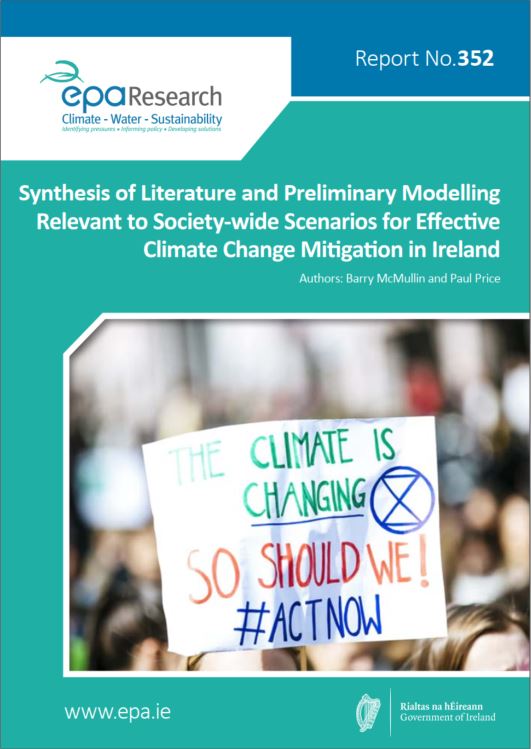Authors: Barry McMullin and Paul Price
Summary: Rapid global warming due to emissions of greenhouse gases (GHGs) caused by human activities is negatively affecting global climate and ecological systems. This research assesses the international literature to inform climate mitigation policy in Ireland and provides a preliminary tool for comparing policy within the Paris Agreement commitments.

Watch the project highlights video
Rapid global warming due to emissions of greenhouse gases (GHGs) caused by human activities is negatively affecting global climate and ecological systems. Rapid reduction of GHG emissions to meet the goals of the Paris Agreement will require transformational changes in society while maintaining and supporting society’s resilience. Ireland’s energy supply is already moving away from the use of coal and peat, but it will also need to rapidly stop using oil and natural gas. Ireland’s electricity grid is world leading in integrating variable wind energy. However, even greater flexibility, including very large-scale energy storage, will be required in future, as well as substantially electrifying heat and transport energy use. Transport emissions continue to be strongly coupled to national economic activity. Agricultural emissions decreased in the 2000s but, since 2010, policy to encourage expansion has greatly increased imports of nitrogen fertiliser and feed inputs, resulting in rapidly rising emissions of nitrous oxide from soils and methane emissions from animals. International aviation and other consumption emissions arising outside Ireland’ borders are projected to grow. Projected Irish population growth substantially increases the required rate of decarbonisation.
This research assesses the international literature to inform climate mitigation policy in Ireland. It provides a preliminary tool for comparing policy within the Paris Agreement commitments. This requires explicit national “fair share” cumulative GHG emission budgets, equitably aligned with the Paris goals to limit global temperature increases, with very limited reliance on high-risk carbon dioxide (CO₂) removal from the atmosphere. Current policy-relevant scenarios and related analyses are too narrowly based, so exploring “radical” scenarios would give a stronger risk assessment basis for climate action to avoid costly surprises. The likely damage caused by climate is being underestimated. Robust climate planning incorporates just transition, social equity (including gender equality), and economic distribution effects. Current national economic and energy modelling is reliant on highly contested simplifying assumptions. Greater use of dynamic simulation modelling to evaluate policy resilience under system change or sudden crisis could better inform societal change and achieve mitigation rates more aligned with the escalating climate and biodiversity emergencies. The use of reactive nitrogen, imported in fertiliser and indirectly via feed, and already effectively reduced in other EU nations, is a primary driver of increasing Irish methane emissions from cattle.
Delayed climate action to date now means achieving GHG emission reduction very rapidly. Further research must occur in parallel with rapid near-term decarbonisation. To drive innovation, overcome carbon lock-in effects and increase social acceptance, existing demand measures (efficiency and carbon pricing) could be complemented by equitable supply-side regulation of imported fossil fuel and reactive nitrogen. Modelling for global climate and sustainable development goals could be improved if it were based on allowable future quantities of fossil fuel and reactive nitrogen use within equitable national budgets, rather than on notional costs. The GHG-WE tool developed in this project provides preliminary modelling of alternative national policy scenarios. For effective climate change mitigation, steadily reducing Ireland’s relatively high non-CO₂ emissions from agriculture could greatly ease otherwise increasingly unachievable reductions solely in CO₂. Recent policy developments in New Zealand, which has similar population and agricultural emissions profiles to Ireland, provides useful guidance for Irish policy development. Protecting existing carbon stocks (in peat and managed forest) should be the strongest priority for near-term mitigation of CO₂ emissions arising from land use.
https://www.epa.ie/media/epa-2020/research/epa-funded-research/Twitter_352.jpg